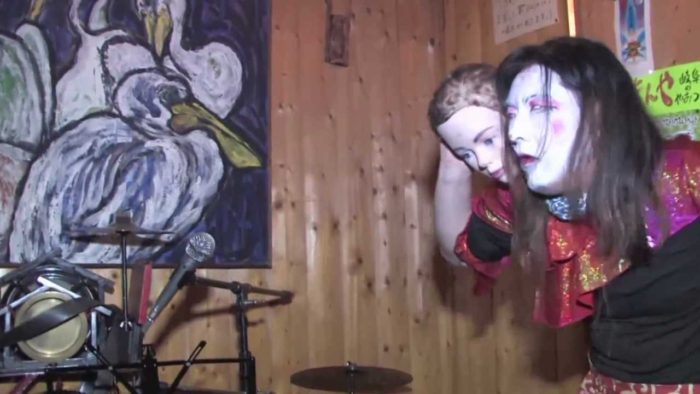In mid-July, we managed to catch a rare live concert by the reticent and ever-mysterious Yoko Ran at Mandala in Aoyama. Backed by cello, piano and acoustic guitar, she delivered a short, but moving set made up of a dozen or so Terayama songs and poems set to music.
On screen, her most striking vocal performance is Sekishuncho, the theme song of Terayama’s surreal autobiographical masterpiece, Pastoral: To Die in the Country. Sitting on top of a ladder, Yoko Ran sings a haunting lament for the mother of an illegitimate child who is bullied into infanticide by superstitious villagers.
Terayama’s dark, ambiguous lyrics shadow a work by an older poet, Tomino’s Hell by Yaso Saijo. The story, it seems, concerns a girl (younger sister) being sold to a brothel-owner (the silver sheep) by her brother (the nightingale) in order to pay for medicines for their consumptive elder sister (who spits blood).
With her identity lost (no family register), she must suffer her fate of bonded prostitution (hell) alone.
In Terayama’s film, the young woman who drowns her baby comes back to the village many years later, having spent the prime of her life working in a big city brothel.
Among the songs featured in the Mandala recital were Hikoki Yo (“Oh, Airplane”), Kanashimi (“Grief”), Kami o Ageru (“I’ll Give You a Hair”) and Nozoki Karakuri Akai Obi (“Red Obi Peepshow Story”). For this last number, Yoko Ran donned the white gloves and top hat of a fairground barker.
The music was mostly in a slow tempo European style, which fitted Terayama’s glimmering images of lonely coasts, mysterious bottles and cursed “obi” kimono belts.
All songs performed can be found on the two CDs she has released: Sekishuncho (”Bird Sorrowing for Spring”), marking the 10th anniversary of Terayama’s death in 1983, and Samaataimu: Umi o Kudasai (“Summertime: Give Me the Sea”), commemorating the 20th anniversary.
Perhaps as a reflection of time passing – Terayama himself would be 84 if still alive today – the concert ended ahead of schedule, with a clearly tired Yoko Ran inviting the audience to drink and chat instead.
Yoko Ran (欄妖子) is a private person and has very little presence on the internet. Her unusual stage name – “Ran” means “orchid” and the character for “yo” in “Yoko” means “weird” or “ghostly” – appears to have been chosen for her by Terayama himself. Her real name is unknown.
 She joined Tenjo Sajiki, Terayama’s experimental theatre troupe, in 1968 and appeared in many productions and all of the feature films he directed. Terayama liked the texture of her voice and soon anointed her the “song princess” of his theatrical productions.
She joined Tenjo Sajiki, Terayama’s experimental theatre troupe, in 1968 and appeared in many productions and all of the feature films he directed. Terayama liked the texture of her voice and soon anointed her the “song princess” of his theatrical productions.
Fifty years on, his appreciation remains valid:
“Yoko Ran’s singing voice, filled with grief and resentment of blood, seems to drag the listener back into the darkness of the womb.”

